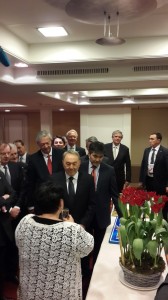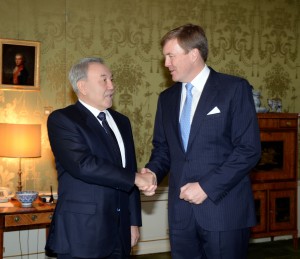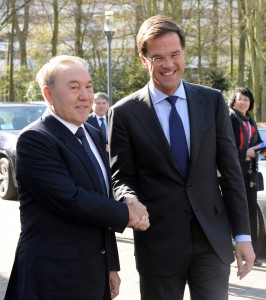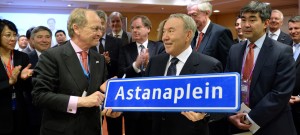
In a ceremony full of symbolism, the Kazakh leader was presented with a new specially bred sort of tulip, called President Nazarbayev.
A Rotterdam square is named after Astana, a new stamp featuring the portrait of the Kazakh President is issued by the Dutch Post, and a new tulip is bred called ‘President Nazarbayev’
THE HAGUE – Kazakhstan and the Netherlands have moved their bilateral relations to a qualitatively new level following the visit here by President Nursultan Nazarbayev on March 23. After a series of meetings, more than half a dozen bilateral documents were signed at the ministerial level and just as many business-to-business agreements were reached advancing cooperation in areas ranging from education and research to space and agriculture and environmental protection.
The Kazakh leader arrived in the Netherlands in the morning of March 23 to pay a bilateral visit to the country first and then to participate in the 3rd Nuclear Security Summit in this city with the participation of more than 50 heads of state and government on March 24-25.
The bilateral visit began with President Nazarbayev’s meeting with Prime Minister Mark Rutte at the latter’s residence of Catshuis. Rutte had earlier visited Astana for the summit of the Organisation for Security and Cooperation in Europe (OSCE) in December 2010.
Nazarbayev and Rutte discussed a wide range of bilateral and internatioal issues, including the situation in Ukraine.
They also focused on nuclear security and disarmament, as well on expanding trade, economic, investment, science and technology and energy cooperation.
Nazarbayev told his host the Netherlands is one of the key and most promising partners for Kazakhstan in the European Union. That is seen in the sheer volume of Dutch investment in Kazakhstan as well as in the fact that there are 800 companies with the Dutch participation that work in the Central Asian nation.
The Kazakh President underscored the importance of stronger cooperation in agriculture and innovation spheres, and invited the Dutch companies to participate actively in EXPO 2017 in Astana. The two leaders also discussed environment and effective use of water resources, as well as the development of transit and transport potential and of the logistical infrastructure of the two countries.
Following that meeting, Kazakh and Dutch officials signed two memorandums of understanding, providing for political consultations between the two foreign ministries and establishing a Business Council which brings together the two countries’ largest trade and industry associations.
President Nazarbayev then moved over to the Huis ten Bosch palace to meet King Willem-Alexander. The two heads of state discussed expanding cultural and humanitarian ties as well as issues on the international agenda.
Returning to The Hague’s historic Kurhouse Hotel, President Nazarbayev was greeted by a group of current and former officials who established a new Friends of Kazakhstan in the Netherlands political club. Jaap de Hoop Scheffer, former NATO Secretary General and former Dutch foreign minister, Rene van der Linden, the Dutch senator, Bernard Weinties, chairman of the VNO-NCW confederation of Dutch enterpreneurs, Rini Wagtmans, Kazakhstan’s honorary consul in the Netherlands, and others spoke to the Kazakh President about ways to expand bilateral dialogue for the benefit of the two countries.
“The Dutch investment in Kazakhstan’s economy have reached $30 billion,” Nazarbayev told the gathering. “Mutual trade stands at $10 billion. Kazakhstan has been implementing an industrial and innovation programme which has already launched 500 new enterprises and provided jobs for 600,000 people. And we invite the Dutch companies to work jointly. We are interested in developing processing enterprises in oil and gas, ferrous and non-ferrous matallurgy, chemical industry. For such industries, we offer preferences and create relevant infrastructure. We are also interested in cooperation in IT and agriculture.”
 That meeting was followed by a presentation by more than two dozen Dutch and European companies of their potential to the Kazakh head of state and other Kazakh and Dutch officials. Companies in areas such as energy, chemistry, transportation, agribusiness, space research, electronics and others participated in an exhibition, which was organised by Kazakhstan’s Ministry of Industry and New Technologies and its KAZNEX INVEST arm and the Dutch counterparts and which resulted in a major boost for trade and economic ties during the visit.
That meeting was followed by a presentation by more than two dozen Dutch and European companies of their potential to the Kazakh head of state and other Kazakh and Dutch officials. Companies in areas such as energy, chemistry, transportation, agribusiness, space research, electronics and others participated in an exhibition, which was organised by Kazakhstan’s Ministry of Industry and New Technologies and its KAZNEX INVEST arm and the Dutch counterparts and which resulted in a major boost for trade and economic ties during the visit.
Royal Dutch Shell presented its vision of the future development of the energy sector in Kazakhstan in line with the country’s 2050 Strategy.
Royal TenCate presented its ready-to-start project with KAZNEX INVEST to produce syntethic and geocomposite materials.
Induss, an international company dealing with water management, presented a major project it has ready with United Chemical Company to clean industrial and technical waters and supply the Taraz Chemical Park free economic zone with a central water treatment installation.
CLAAS, an international company producing agricultural machinery, presented a model of its XERION tractor that it hopes to be soon producing in Kazakhstan.
Diehl Defence Land Systems, another international company specialising in producing machines for both civilian and military use, presented its project with Kazakhstan Engineering to produce caterpillar tracks with a potential to expand the range of products made in Kazakhstan.
During that exhibition, several memorandums of understanding were signed between both companies and government ministries, including those covering cooperation in agribusiness, space research and establishing ties between Nazarbayev University and the famous High Tech Campus of Eindhoven. The latter agreement will be useful for Nazarbayev University as it presses ahead with a plan to build its own technology centre in Astana.
Another memorandum of cooperation will provide for the exchange of expertise on matters of environment protection.
The Kazakh leader’s visit to The Hague had a good share of symbolism, too. During the political club event at the Kurhouse Hotel, Dutch officials presented President Nazarbayev with a stamp with his portrait issued by the Dutch Post and a street sign of “Astanaplein” for a new square named after the Kazakh capital in Rotterdam. And, in a highly symbolic gesture, Minister of Agriculture Sharon Dijksma presented him with a bucket of specially bred new sort of tulips called, rather expectedly, “President Nazarbayev,” essentially making a full circle and returning the flower to the leader of the country where tulips are believed to have originated and still grow in the wild.
